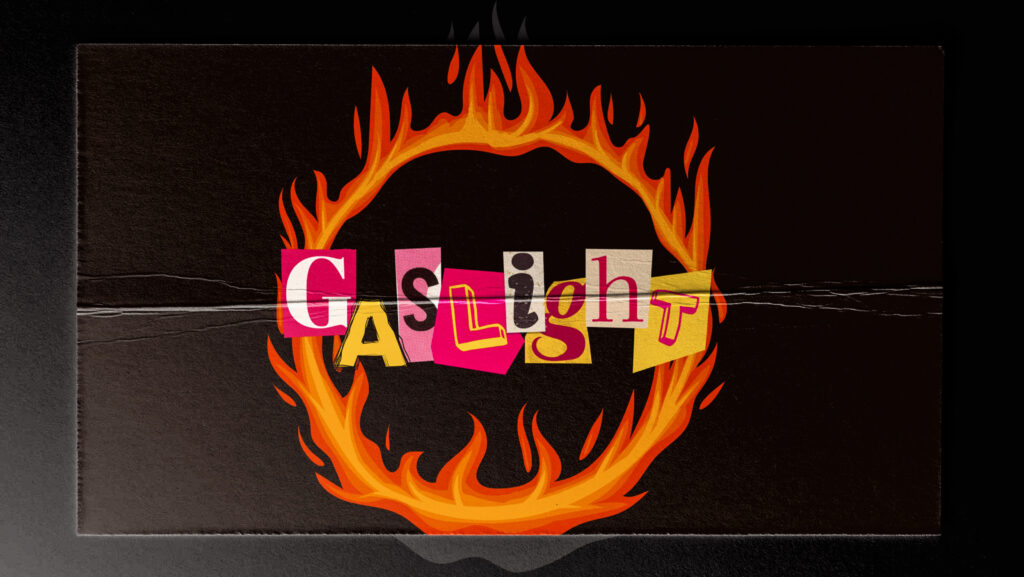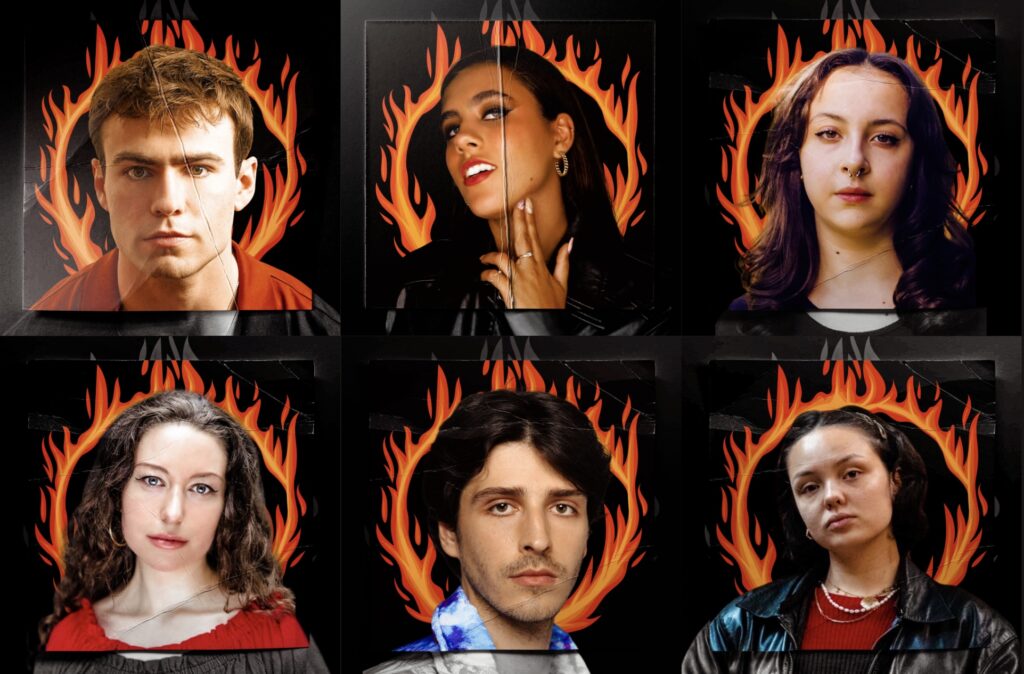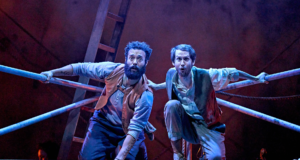Shaira Berg, Arianna Munoz and Sarah Walton-Smith on Gaslight
Fringe theatre is never afraid to tackle the difficult and uncomfortable. And that is just what Gaslight will be doing when it comes to Etcetera Theatre as part of Camden Fringe this month. Gaslight looks to explore sexual assault and how we support, or even fail to support, these affected. It’s certainly an issue that feels forever in the news but which we still don’t seem able to find an answer for.
We caught up with the play’s writer/ actor/ producer, Shaira Berg, along with director Arianna Munoz and actor/ producer Sarah Walton-Smith, to find out more about the play and why sexual assault is such an important subject that we need to talk about more.
What was the starting point for writing Gaslight? Was it one specific incident or a collection of news stories?
Shaira: Gaslight was born as a cathartic medium to have my voice heard following being the victim of a sexual assault case, however, as I began writing the experiences that the lead character ‘Scarlet’ faced became more of an adaptation of my own story. Sexual assault is not a rare phenomenon and creating a play that explores the aftermath of dealing with such trauma in an impactful and memorable way is more important than ever.
The play is set at university; are they more of a problem than elsewhere then? Is there still a lot of work to be done within universities to offer adequate support?
Sarah: I think that universities can be sites of huge entitlement and privilege, and this can bleed into a sense of entitlement over other people and their bodies. Coupled with the prevalence of alcohol and drinking culture, especially in sports societies, it becomes incredibly easy to spin the narrative that someone ‘had a bit too much to drink’ and made a ‘bad decision’ that they ‘regret in the morning’ rather than the reality that alcohol is used maliciously as a drug to take advantage of vulnerable people.
I think that universities often see sexual assault cases as one person’s word over another, careful not to assign blame where the facts are blurry. But this approach is cold and clinical, putting victims through shame, embarrassment and trauma as they have to recount their story again and again to various officials, boards and panels as they fight for their voice to be heard. It will always be difficult to ‘prove’ cases of sexual assault, but this is not the point nor the responsibility of a university. They should provide a safe, listening ear for victims whether they choose to report their assault or not – whether this be a tutor, counsellor, nurse or support group. There should also be direct discussion with students about rape culture, where it originates from, what it looks like and how we can all work to eliminate it. I think in some universities there are moves to do this, but not enough time is spent doing so and it is not uniform enough. I personally think it needs to be a huge part of compulsory sex education from high school age right through to universities.
How difficult is it to create a play with such a difficult theme, whilst still balancing the need to entertain?
Shaira: One of the first questions I asked myself when writing Gaslight was how can I translate such a sensitive and triggering theme into an enjoyable stage performance and it was very difficult to come up with a way that would not present this particular case of sexual assault as an outwardly violent incident. The viewer never witnesses the assault itself and using the physical wound was a way to maintain the sensitivity. Moreover, in the majority of sexual assault cases, the perpetrator is someone close to you that you trust, and it is rarely as violent as portrayed in film. Therefore, there was an opportunity to approach the theme from a more mysterious and metaphorical angle through the use of the physical wound. Despite this, the fallout that occurs after such an incident is where most of the damage sits and there was a need to encapsulate this within the story.


The play presents sexual assault as a physical wound, what is the thought process behind this?
Shaira: Portraying sexual assault as a physical wound enabled me to explore sexual assault through a metaphorical lens to remain sensitive to triggers surrounding such experiences. The use of a consistently and brutally dismissed expanding physical wound allowed me to explore the trauma following assault in a shocking dystopian setting in which every viewer will be able to vicariously experience the frustrations that the lead character ‘Scarlet’ faces as she navigates her environment. Gaslight is designed to be gut-wrenching and leave the viewer thinking ‘Why is no one taking this seriously?’. Using the ticking time bomb of a physical life-threatening wound is an effective way of achieving this.
Moreover, I believe that the incident itself was less important to recreate on stage, rather focusing on the fall-out following such trauma. I find that in popular culture, stories revolving around themes such as sexual assault and mental health focus very heavily on the incident itself, therefore modelling the play around the fallout was a way to demonstrate the burden that comes with experiencing sexual assault and how it affects relationships, friendships and everyday life around the victim.
Is it important that we tackle such uncomfortable subjects on stage? And how do you feel this can help raise awareness in the wider community?
Arianna: It is undoubtedly important that we tackle uncomfortable subjects on stage; indeed, I’d argue that exploring such topics is the core goal of modern theatre. One need only look at some of the most significant/popular works in recent theatre history – Dear Evan Hansen, Slave Play, the revival of Oklahoma!, and Prima Facie, to name a few – that tackle difficult and taboo subjects with an unflinching and enthralling lens that live theatre alone can offer.With its magical-realism conceit of an unhealing, ever-expanding wound as the physical marker of sexual assault, Gaslight places itself within this practice, achieving what I believe to be a poignant and complex representation of enduring a traumatic experience.
 Of course, some question why theatre should broach difficult subjects; surely the arts are best as a form of escapism? However, I believe theatre that tackles uncomfortable topics through a creative lens offers a way for people to begin to comprehend experiences outside of their own. Additionally, one can only address an issue if people are willing to talk about it; theatre presents a communal space where one is encouraged to think critically, to ask difficult questions. Theatre is not the end, but rather the starting point for an individual or community to open the door for discussions and awareness of these challenging topics.
Of course, some question why theatre should broach difficult subjects; surely the arts are best as a form of escapism? However, I believe theatre that tackles uncomfortable topics through a creative lens offers a way for people to begin to comprehend experiences outside of their own. Additionally, one can only address an issue if people are willing to talk about it; theatre presents a communal space where one is encouraged to think critically, to ask difficult questions. Theatre is not the end, but rather the starting point for an individual or community to open the door for discussions and awareness of these challenging topics.
What do you want people to take away with them after watching Gaslight?
Sarah: I think we agree that the message of Gaslight is to pay attention. Pay attention to your loved ones and how they are acting. Listen to them when they tell you how they are feeling. Don’t brush things under the carpet if you have a gut feeling that maybe there is something deeper and more serious going on for them. Have conversations with your friends about sexual assault and harrassment – regardless of gender. What makes Gaslight so raw and human is that no character is black or white. They are all flawed, and I think a lot of people will see their family and friendship groups reflected back at them. It is a collective responsibility to love those around us yet also hold them accountable, helping each other to unlearn attitudes that are rooted in misogyny and insecurity. I hope that people see Gaslight as a representation of the complexities around sexual assault, and probe them to think about how they can make a move to counter it in their own circles.
Thanks to the team for their time to chat.
Gaslight plays at Etcetera Theatre as part of Camden Fringe between 17 and 20 August. Further information and bookings can be found here.
 Everything Theatre Reviews, interviews and news for theatre lovers, London and beyond
Everything Theatre Reviews, interviews and news for theatre lovers, London and beyond



